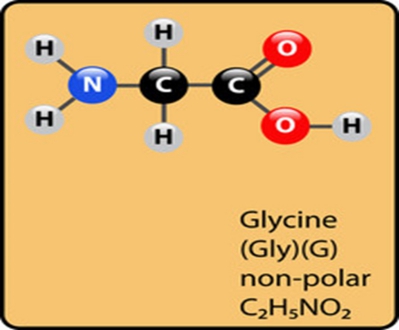Glycine
Description : Glycine is an amino acid, which helps in the biosynthesis of proteins within body.
Article Details :
Glycine is an amino acid, which helps in the biosynthesis of proteins within body. Glycine is a non-essential and simple form of amino acid that can be synthesized by body hence if it is not taken from diet it would not cause such deficiency. Natural protein rich foods contain glycine in significant amount, so consumption of such food can easily meet the requirement of glycine. Though it is synthesized by body, but it should be consumed through daily diet for maintaining the internal balance of glycine. The main function of glycine is to treat schizophrenia and related neurological disorders.
The potential health benefits of glycine make it more worthy and now it is commercially available as supplementary product and widely used to fight against malnutrition.
Chemistry
- Glycine is a monoamino and monocarboxylic acid, acts as building block of protein. It has found that several glycine molecules are bound with each other through peptide bonds and help to form protein
- It contains aliphatic side chain in its structure
- The formula of glycine is CH2-NH2-COOH
- It is consisting of one amino group, one carboxylic group, two hydrogen and one carbon atom
- It is colorless, sweet in taste and crystalline solid in nature
- It is a proteinogenic amino acid. The amino acid which is incorporated into protein during protein synthesis is known as proteinogenic amino acid

Sources
Human can synthesize glycine within body and furthermore it can be obtained through diet (natural source) or by taking supplements. Consumption of glycine from natural source is comparatively healthy than taking supplements as consumption of excessive dietary glycine does not cause any toxicity but consuming too much supplement can cause various health hazards.
The below table gives a good overview of the various sources of glycine
|
Amino acids that synthesize glycine in body |
Food stuffs that contain glycine |
|
|
Needs of glycine in daily life
Apart from treating schizophrenia, glycine is required to treat several other diseases which include –
- Diabetes
- Kidney failure
- Obsessive-Compulsive Disorder
- Psychotic Disorders among Children
- Ulcers on legs
- Benign prostatic hyperplasia (BPH)
- Heart attacks
- Metabolic disorders (inherited)
- Glycine helps to protect kidney from the injurious side effects of drugs mainly used after kidney transplantation
Risks of glycine metabolic disorder
Disorders of glycine metabolism are very harmful and associated with developing several diseases. It should treat properly otherwise it would become fatal. The harmful effects of this impaired metabolic syndrome include –
Glycine encephalopathy
- Several researches and studies have shown that impaired glycine metabolism is responsible for the development of glycine encephalopathy (Alfadhel et al., 2016). Glycine encephalopathy is an inherited metabolic syndrome, which is characterized by deficiency of glycine splitting enzyme, mainly caused by gene mutation
- Deficiency of this enzyme causes dramatic increase in the concentration of glycine that interferes with normal glycine functions
- Glycine acts as chemical messenger and helps in the transmission of signal or stimuli in brain but abnormalities in glycine level hamper this function and causes various neurological disorders like intellectual disabilities, behavioral problems, optical atrophy (vision loss caused by damages of nerves present in eyes), lethargy and hypotonia (poor muscle tone)
Argininie Glycine amidinotransferase Deficiency
- Argininie glycine amidinotransferase is an enzyme, which is required in Creatine metabolism and deficiency of this enzyme results in irregular formation and transportation of creatine
- Improper utilization of glycine can cause the argininie glycine amidinotransferase deficiency
- This condition is known as cerebral creatine deficiency syndrome and characterized by delayed speech, seizure activity and intellectual disabilities
Health benefits of glycine
Here we will discuss the health benefits of glycine




